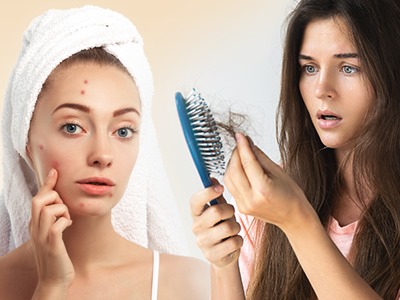Hard water is a common household issue that many people overlook. While it may not seem like a big deal, the high mineral content in hard water can have noticeable effects on your body. From dry skin to dull hair, your body might be sending you signals that it’s time to check your water quality.
There are two easy ways to check hardness of the water you are using.

1st Easiest Way: Use a Hardness Test Kit
The first and most straightforward way to answer this question is by using a hardness test kit. These kits provide a clear measurement of your water’s mineral content. However, most of us do not own such a kit and, in all probability, will not buy one.
2nd Easiest Way: Check with Your Body
Your body can often be the best indicator of hard water issues. If you are experiencing any of the following signs, it might be time to check your water quality:
- Excessive Hair Loss – Are you noticing unusual hair fall despite maintaining a healthy lifestyle?
- Itchy Scalp or Skin – Does your scalp or skin feel itchy, especially after taking a bath?
If the answer is yes, then your water quality could be the culprit.
What Is Hard Water?
Hard water contains high levels of minerals like calcium and magnesium. These minerals accumulate as water moves through limestone, chalk, and other deposits before reaching your home. While hard water isn’t harmful to drink, its impact on your skin, hair, and overall hygiene can be significant.
Signs That Hard Water Is Affecting Your Body
- Dry and Itchy Skin
The minerals in hard water strip away natural oils from your skin, leaving it dehydrated. This can lead to irritation, increased sensitivity, and even worsening of conditions like eczema and psoriasis. - Dull, Brittle Hair
Hard water makes it difficult for shampoos and conditioners to lather properly, leaving behind a residue on your hair. This can cause your hair to look dull, feel rough, and become more prone to breakage. - Frequent Breakouts and Clogged Pores
Mineral deposits from hard water can clog your pores, leading to acne and other skin issues. The residue left behind on your skin may mix with oils and dead skin cells, increasing the risk of breakouts. - Soap Doesn’t Lather Well
If you’ve noticed that your soap doesn’t foam up as it should, hard water is likely the cause. This can make it harder to cleanse your skin effectively, leaving behind a film that contributes to dryness and irritation. - Rough or Irritated Scalp
A dry, flaky scalp can also be a sign of hard water. The mineral buildup can strip moisture from your scalp, leading to itchiness and dandruff.
What Can You Do About Hard Water?
If you suspect that hard water is affecting your body, here are some solutions:
• Moisturise Regularly: Combat dryness by applying a rich moisturiser immediately after bathing.
• Clarifying Shampoo: Use a clarifying shampoo once a week to remove buildup from your hair.
• Test Your Water: You can use a simple test kit to determine your water’s hardness level and take appropriate action.
• Install a Water Softener: A whole-house water softener can remove excess minerals, preventing buildup on your skin and hair.
Final Thoughts
Hard water may not be an obvious issue, but its effects on your body can be significant. If you’re experiencing persistent skin or hair problems, it might be time to check your water quality. Making small changes can lead to healthier skin, softer hair, and a more comfortable daily routine.
Reach out to us if you wish to get a WATER HARDNESS TEST done at your place for FREE.

